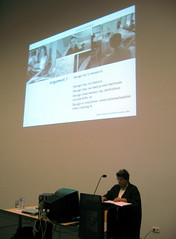This is the point to make changes if you are not happy with things. Are you really answering the question? Perhaps you can be more explicit about how certain findings relate to the essay title. Are you finding that bits are too digressive; that you are going off at a tangent and losing the thread of the argument? Be bold in cutting what you have written, if it makes the essay flow better. Are you evaluating the findings rigorously enough? Can you go further? Have you gone too far, and included too much of your own opinion and speculation?
Last week I noted that your conclusion should only go as far as the evidence allows it to go. Go ahead and speculate; gaze into your crystal ball at what delights future research will bring, but be clear about the limits of that kind of speculation. If you have taken other researchers to task for over-interpreting their findings, then make sure you don't fall into the same trap. If you have clearly established the limitations on the facts, then it will be clear to your reader what your basis is for any further speculation.
Don't be tempted just to repeat what you've said so far without developing it in any way. Your conclusion is the place to draw your argument together: that is bound to mean recapping on that argument, but you need to do it succinctly and in a way that builds on its meaning. For example, don't just repeat your judgement that the evidence favours Theory Y over Theory X. Put that conclusion in context, by perhaps returning to the historical background within which those theories were developed, or by highlighting some issues that are currently 'in the air', and might help to contextualise your conclusions.
A common technique in journalism is to return to the starting point for the piece. If you kicked off with a quotation, or a particular finding, then you might want to go back to it in light of what you've learned through the essay. Don't force it: that approach won't always be appropriate. But it is usually worth bearing your starting point in mind when you are considering your ending.
You're nearly there. Next week we'll talk about the all-important question of presentation.

![Reblog this post [with Zemanta]](http://img.zemanta.com/reblog_e.png?x-id=3f9c6e60-1241-4480-b4dc-cf3dd5828e07)



No comments:
Post a Comment
Note: Only a member of this blog may post a comment.